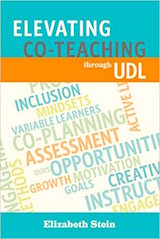Co-Teachers! Are You Willing to Be Disturbed?
A MiddleWeb Blog

Yet, in my travels and virtual connections, I have met many teachers who connect the role of leader with someone else.
Let’s zoom this leadership conversation directly in on co-teachers. Some co-teachers feel well balanced as two leaders in the room (three cheers to you, but there’s still room to fine tune your balance!).
But there are also far too many co-teachers who feel an imbalance as one co-teacher takes on a stronger (and sometimes stifling) lead – which leaves the other co-teacher feeling suppressed. Do you know any of these dominant co-teachers? It’s pretty devastating when you think about it.
Two Leaders in the Room
So let’s consider the concept that when there are two teachers in the room, there are two leaders – with two distinct areas of expertise and with double the desire to provide optimal learning environments for everyone.
Here’s the part where we get our leadership juices flowing! Take a minute to check-in with yourself and connect with the skills, characteristics, and responsibilities that you exude to support the leader in you.
Keep in mind that whatever view you hold of yourself as a leader, you can take the next step to improve your co-teaching relationship. Simply consider whether you are an independent or dependent leader.
Are You an Independent or Dependent Leader?
The idea of being independent is clearly a glamorous view – it makes us feel strong, valued, and powerful. It validates that we have something important to share as we steadfastly remain on our journey to make a positive difference in the lives of our students and their families.

This is a huge mindset shift for co-teachers! Check out what Trish McFarane has to say about how effective leaders are those who depend on others –who work as a team – who combine their expertise with others in collaborative, powerful ways.
It is tempting to view an independent leader role as the better option. We like the idea that we have something unique to give to the world. Yet it is within the role of a dependent leader who contributes greatly to generating desired outcomes.
“Effective leaders combine their expertise with others in collaborative, powerful ways.”
Strong leaders naturally combine their instincts and actions with others through collective collaborations and ongoing learning outcomes. It’s about the relationships we co-create that allow for a multi-faceted leadership process to unfold while valuing multiple perspectives along the way.
So now the question that comes to my mind is, how can co-teachers nurture a dependent leadership team? For me, the answer is simple. Each co-teacher must be willing to be disturbed. Hopefully, your curiosity is piqued and your mind is wide open…so let’s continue….
A Willingness to Be Disturbed
One of my favorite posts from our Two Teachers in the Room archive discussed the need for co-teachers to share some difficult truths through Four Critical Co-Teaching Conversations.
I would like to add another layer to these necessary co-teaching conversations: a willingness to be disturbed – stepping outside of our comfort zones – and ultimately evolving within a powerful collaborative learning environment.
Being disturbed may sound a bit unsettling to some of you, but stay with me here and I’m sure that you will be surprised how comforting it can be.
Margaret Wheatley (2009) shares insights on the need for individuals to communicate with one another in order for collective collaborations to co-create a positive impact on the world. It’s all about
(O)ur willingness to have our beliefs and ideas challenged by what others think. No one perspective can give us the answers we need to the problems of the day. Paradoxically, we can only find those answers by admitting we don’t know. We have to be willing to let go of our certainty and expect ourselves to be confused for a time.”
Wheatley explains that we must be “Willing to Be Disturbed” in order to “restore hope for the future.” Co-teachers! Are you feeling it?! The implications for co-teaching are tremendous! Take a minute to read her complete text. Print out the three pages (you’ll want to read it again and again) and grab a cup of coffee or tea.
Find a place in your reading that resonates with you – lift that line – add it to the comments section below – and share your thoughts. Let’s be willing to be disturbed together.

How can you nurture and support your co-teacher’s willingness to be disturbed in order to nurture positive co-teaching experiences this year?
































This is great! We love to be disturbed… My co-teacher and I are often challenging each other and being challenged by our mentor… Thanks!